Our top-rated flat and clipless shoes for mountain bikers
The best mountain bike shoes are comfortable and breathable, provide a stable pedalling platform and protect your feet from trail debris and crashes. They’ll be easy to get on and off, dry fast and not weigh too much.
Struggling to find something that meets all of these needs? Well, you’ve come to the right place. Our in-depth buyer’s guide to the best mountain bike shoes will help you choose the best kicks for you, as well as provide some information on the foundations of a good mountain bike shoe.
You’ll find all the best mountain bike shoes we have reviewed here – whether you ride cross-country, trail, enduro or downhill on flat or clipless pedals, we’ve ridden and rated the best mountain bike shoes on the market.
To make things easier, we’ve split this list into different types of mountain bike shoes:
- Best mountain bike shoes for trail and enduro riding
- Best cross-country mountain bike shoes
- Best MTB flat-pedal shoes
These categories aren’t fixed and many of the shoes are compatible across riding disciplines, but it’s a good place to start if you’re not entirely sure what you’re looking for.
We have also included our mountain bike shoes buyer’s guide at the bottom of the page with advice on what to look out for when picking your next shoes.
Best mountain bike shoes for trail and enduro riding
Trail and enduro shoes tend to have solid, robust designs that can withstand a battering. The soles are stiff, but not so stiff you can't take part in a bit of hike-a-bike. Many look like flat-sole mountain bike shoes, but others are more similar to typical clipless XC shoes.
All the shoes here take cleats for clipless pedals.
Five Ten Kestrel Boa
- £200 / $230 / €230 as tested
- Pros: Super-secure fit; impressive power delivery
- Cons: Pricey; not the best to walk in
The Kestrel Boa is designed for downcountry riding, with the shoes covering cross-country and trail duties thanks to a stiff sole and secure fit.
We found the Kestrel Boas to be less awkward to wear then XC shoes, while maintaining high levels of power transfer through their stiff sole.
The shoes remained comfortable on long rides thanks to their great fit, which resulted in zero pressure points or hotspots.
Although the Kestrel Boas are priced towards the top end, we'd say the features make them worth the money.
Leatt 6.0 Clip V22

- £130 / €149 as tested
- Pros: Sturdy construction; features an ATOP dial rather than Boa
- Cons: Heavy considering the amount of protection
Leatt’s 6.0 Clip V22 shoes are manufactured using a single woven upper with various abrasion and impact-resistant panels. The brand uses cat’s-tongue material on the inside of the heel to reduce heel lift.
The well-considered fit and breathable upper impressed, as did the ventilated mesh weave. The mesh holds very little water and if they do happen to let a little in, they’ll dry fast. We didn’t find any fault with the ATOP dial, with the clicks defined in feel and noise when tightening.
Shimano GE7

- £180 as tested
- Pros: Lots of cleat adjustability; well-balanced sole; good comfort
- Cons: Pricey; laces are slower than Boa competition
The GE7 is Shimano's mid-range, gravity-focused shoe, packed with tech to make riding or racing downhill more controlled and comfortable.
We found the shoes to provide high levels of comfort on long rides, with a well-supported feel offering a good balance of flexibility and stiffness.
There's plenty of protection, but we found the laces slower than the Boa dials or ratchet systems that are usually found on shoes in this price range.
Shimano ME5
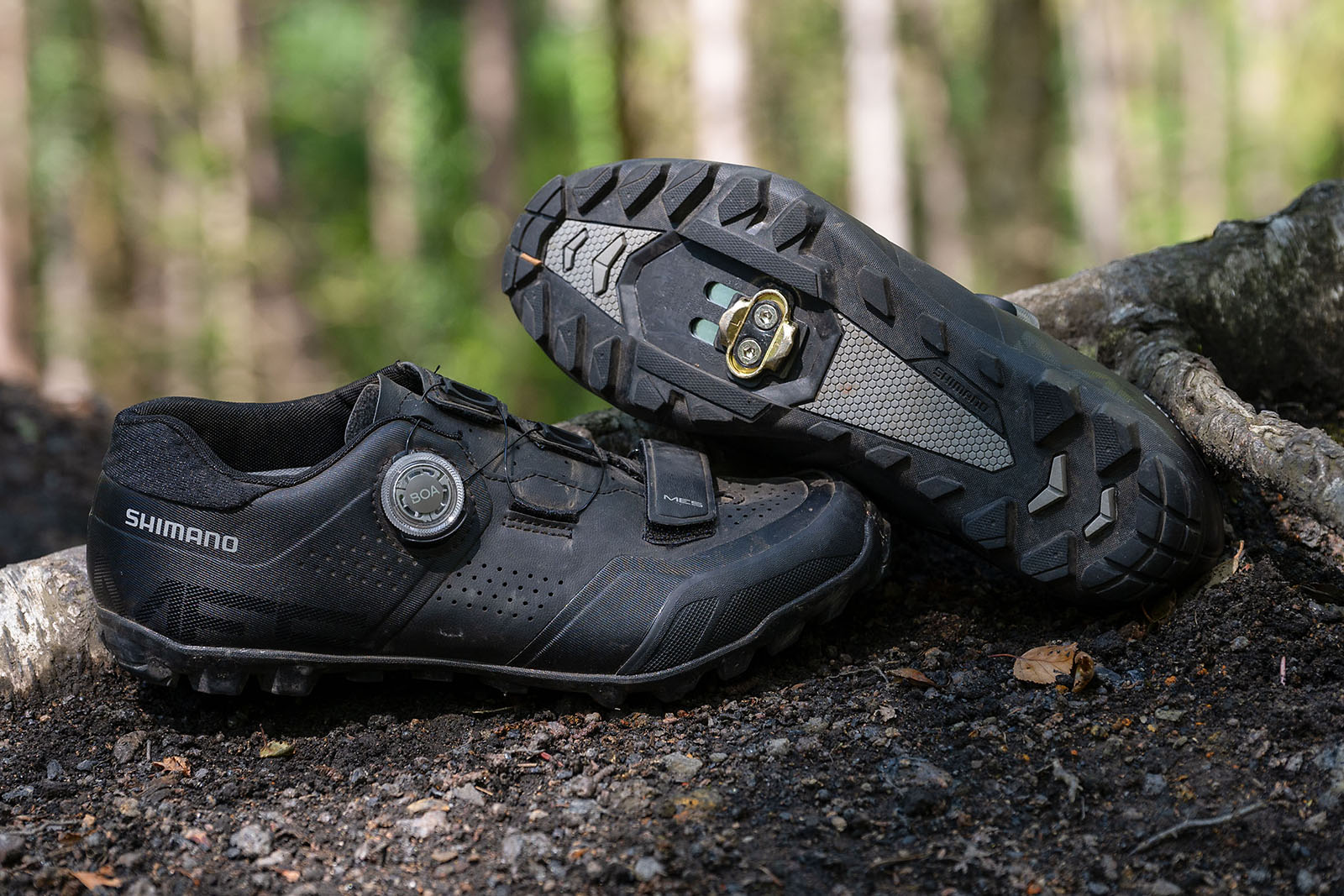
- £140 / $160 / €160 as tested
- Pros: Efficient closure; good balance of stiffness and flex; well-padded ankle support
- Cons: Flex slightly around small pedals
Shimano's ME5 shoes are aimed at trail and enduro riding, and feature a Boa dial closure that locks the shoes solidly to your feet.
We found the ME5s comfortable out of the box, with the supple upper creating zero pinch points when tightened by the Boa dial.
The soles feature just enough flex so you feel feedback from what's below you, while being supportive enough to transfer deep efforts into forward momentum. However, the sole does slightly flex around smaller pedals.
The ME5s offer great levels of comfort and performance at a decent price.
Crankbrothers Mallet Speedlace

- £150 / $169.99 / €169.99 as tested
- Pros: Comfortable for longer rides; well-ventilated; efficient pedaller
- Cons: Strap squashes the lace runner onto foot
The Velcro strap that secures the lace on a Speedlace system makes it quicker and easier to make smaller adjustments to tension compared to a traditional lace-up closure.
On the trail, we found the Mallet Speedlace to be a comfortable and well-ventilated shoe. The sole is fairly stiff, although there is some give at the toebox area to aid with walking.
They even come with a set of Crankbrothers’ own cleats in the box, but they work well with Shimano’s SPD too.
Endura MT500 Burner Clipless

- £129.99 / $159.99 / €159.99
- Pros: Excellent sole; well-designed insole; nicely-built upper
- Cons: Lets splashes in; cleat spacer needed if not looking for locked-in feel
The Endura MT500 Burner is a comfortable and well-fitting shoe for enduro and trail riding.
The insole has a metatarsal button, helps spread your big toe and prevents your foot from scrunching.
The sole of the shoe has an aggressive tread, offering plenty of grip if you have to push your bike up sloppy trails. The cleat is free to move 39mm front to rear – as much as any shoe on the market. You might need a cleat spacer if you don't want to feel locked in.
The upper is nicely built and ventilated, but it does let water in.
Fox Union BOA
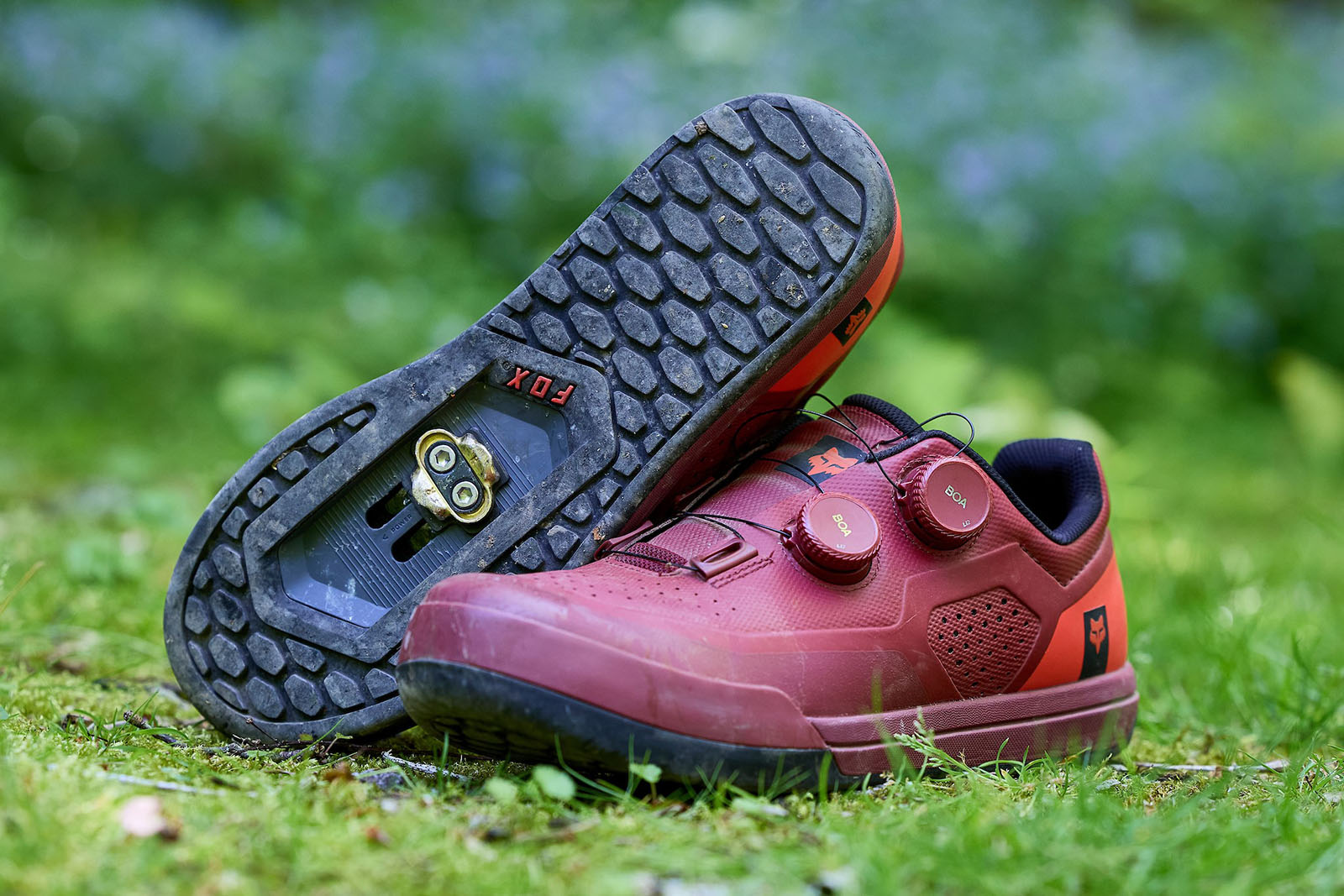
- £220 / $250 / €240 / AU$350 as tested
- Pros: Tuneable insole; solid and protective; good power transfer
- Cons: Not that comfortable for walking in; pricey
The Union BOA is the priciest entry in Fox's shoe range, but the Boa closure and tunable insole offer an impressive fit.
The sho has a solid feel, which feels like it aids power transfer while offering high levels of protection, especially around the toe box.
Walkability isn't great, and the shoes aren't as comfy as others, but the tough build and power transfer make these shoes impressive on the bike.
Northwave Rockit Plus
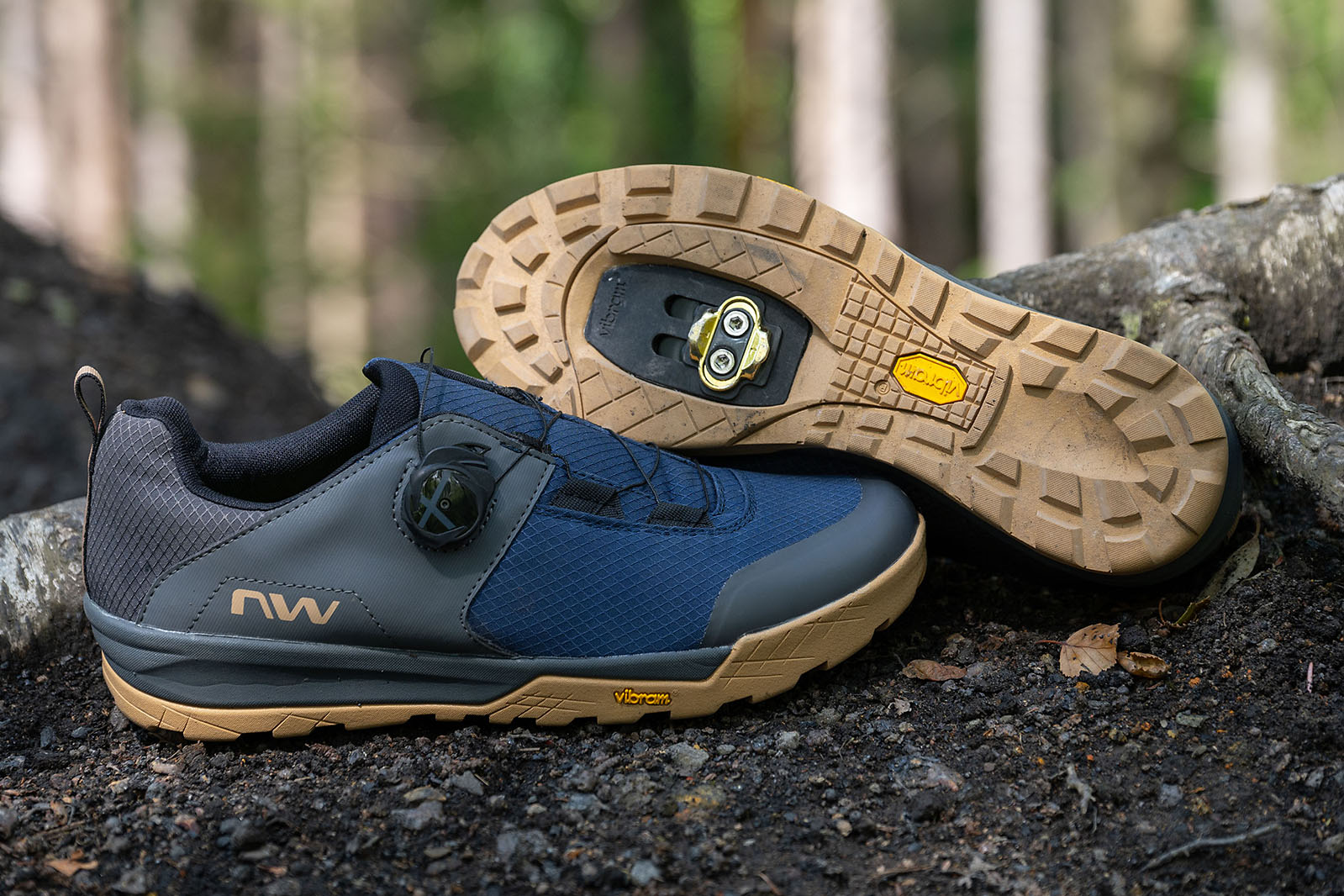
- £135 / $165 / €150 / AU$248 as tested
- Pros: Neutral footbed; versatile and comfortable; good adjustability
- Cons: Cleat setup can be fiddly; need to be tightened hard to secure foot
Northwave's Rockit Plus shoes are designed with versatility in mind, providing good levels of comfort on the trails and beyond.
The sole is comfortable and adds levels of control thanks to its flexibility, though this does take away from the power transfer when pedalling.
While the upper has no pinch points, the shoe needs to be cinched up tight for a secure feeling.
Shimano AM5 (AM503)
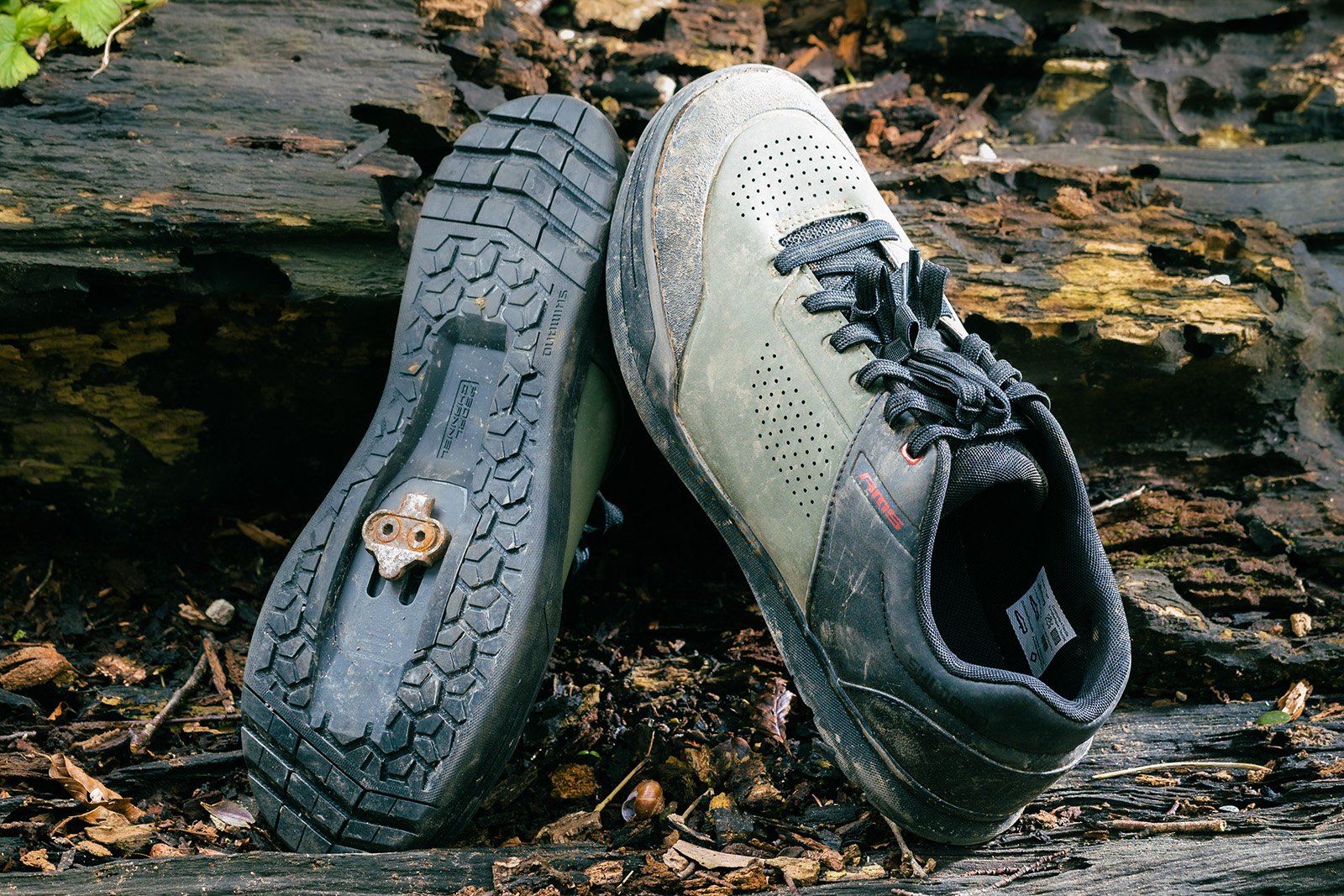
- £80 / $100 / €100 / AU$130 as tested
- Pros: Considered features for the price; lace closure; good connection to pedals
- Cons: A touch too flexible; toe touches crank
The Shimano AM5s impressed with their solid ventilation and ample ankle protection.
The laces come quite far up the foot to help secure your ankle, even if there isn’t any grippy material on the inside to prevent heel lift.
There are perforations in the shoe to assist with ventilation, and although they will let in water, the synthetic material means they dry quickly.
Shimano GE9

- £220 / $225 / €220 / AU$260 as tested
- Pros: Very comfortable; good breathability and splash protection
- Cons: Boa dials can get gritty; pricey
The GE9s are Shimano's top-of-the-range gravity and enduro-focused clipless shoes featuring a strap and Boa retention system.
We found the shoe comfortable and unrestrictive, while providing plenty of protection and support.
The Boa holds your foot well in the upper and keeps it from wandering around on bumpy trails.
With great support on the bike, the sole makes these comfortable to walk in should you have to hop off and push to the top of a trail.
Ride Concepts Transition
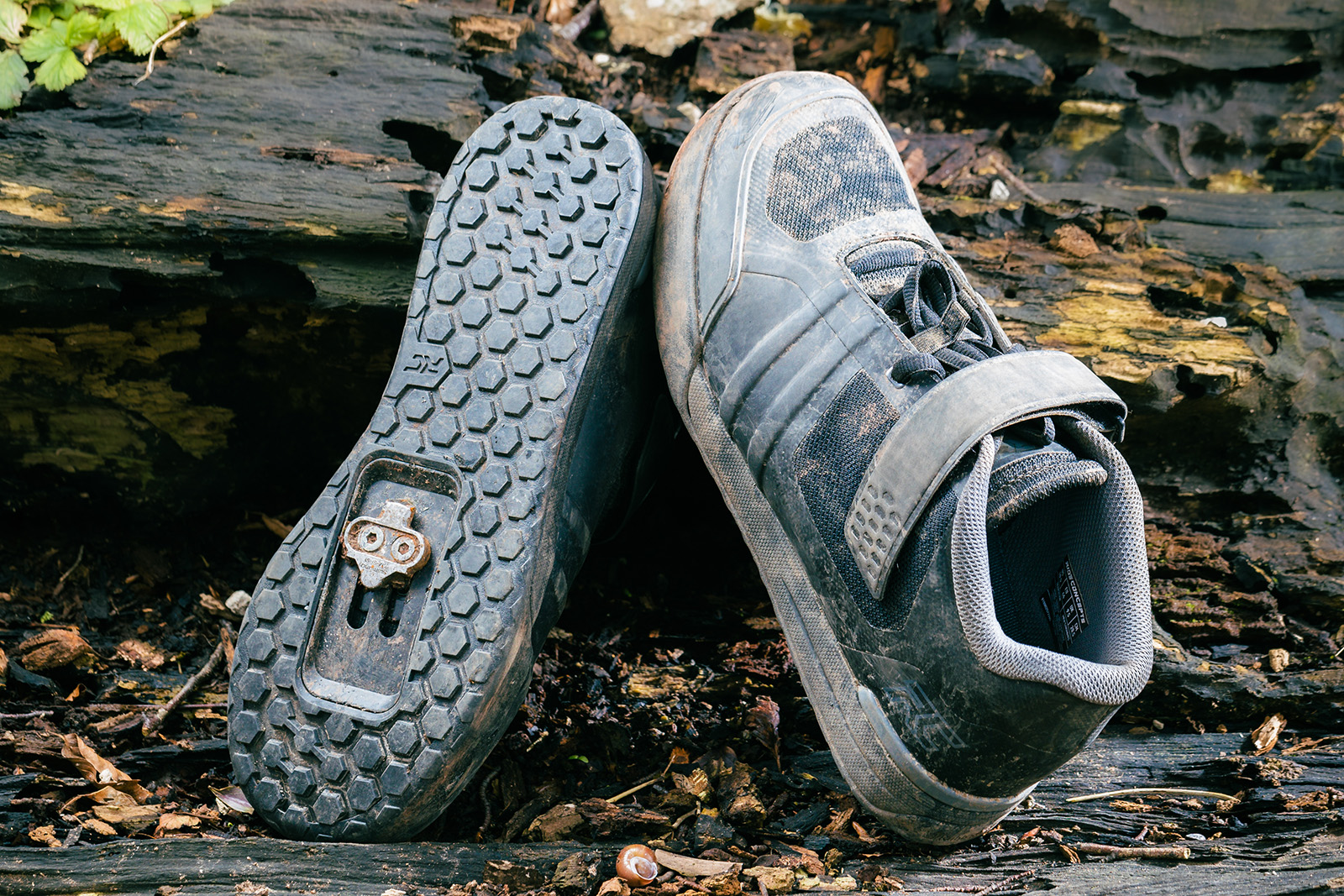
- £150 / $160 / €189.49 / AU$271.49 as tested
- Pros: D30 shock-absorbing inserts; high levels of protection; secure foothold
- Cons: On the stiffer end of the spectrum
The Transition is a more gravity-focused shoe that utilises DST 8.0 MID GRIP rubber throughout its bulky-looking sole.
The D30 insert is a soft material that hardens on impact that can be found on the lower portion of the shoe.
They’re a bit heavier than some of the competition, and take an age to dry if they get soaked, but the Transitions are a great pick if foot protection and a stiff sole are your top priorities.
Bontrager Rally

- £155 / $155 / €170 / AU$250 as tested
- Pros: Incredible comfort; versatile across all mountain genres; good pedal feel
- Cons: Flexible sole doesn't work with smaller pedals
The Bontrager Rally is an extremely comfortable shoe with impressive ventilation. The sole is on the more flexible side, which Bontrager has designed as more of a relaxed fit with a roomy toebox, making them ideal for longer days on the trails and to ease walking.
To avoid feeling the cleat when riding, the shoe would be best paired with a pedal with a cage. The Rally features a lace closure with a Velcro strap cinching the shoe at the top.
Ion Rascal Select BOA

- £170 / $199.95 / €200 as tested
- Pros: Designed with descending in mind; well-ventilated despite bulky appearance; fast drying
- Cons: Upper not the snuggest feeling
The Ion Rascal Select BOA features a more rearward cleat channel due to being a more gravity-orientated shoe. There is impact protection at the heel and they are very easy to put on and take off as the tongue opens wide.
We were unsure of the Boa dial’s placement at the top of the tongue as it focuses tension at the top of the foot rather than throughout.
Best XC mountain bike shoes
Cross-country riders are always looking to save weight and go faster. As a result, cross-country mountain bike shoes tend to look a lot more like road cycling shoes than other mountain bike shred slippers.
Like road shoes, they have stiff soles and lightweight uppers, but they do have deeper lugs and take two-bolt rather than three-bolt cleats.
FLR F-57

- £70 / $70 as tested
- Pros: Comfortable; well-priced; good on and off the bike
- Cons: Velcro fasteners need to be kept clean
The F-57s show you don't have to spend three figures to get a well-designed XC shoe, providing good comfort and efficient pedalling characteristics.
We found the aggressive tread lugs added great traction for off-the-bike use, such as pushing up muddy inclines.
Our only criticism is the Velcro closure, which loses its adhesion if not kept clean.
Sidi MTB Gravel

- £195 / $250 / €189 / AU$280 as tested
- Pros: Comfy yet stiff enough; great stability
- Cons: Flat insole profile; weight
Sidi's MTB Gravel shoes are built on the brands MTB Competition sole and uses a single Tecno-3 dial for closure.
The sole offers excellent stability thanks to Sidi's heel cup, while providing high levels of power transfer to the pedals.
The only niggle we found was the flat footbed which offers very little arch support.
Sidi Dust MTB
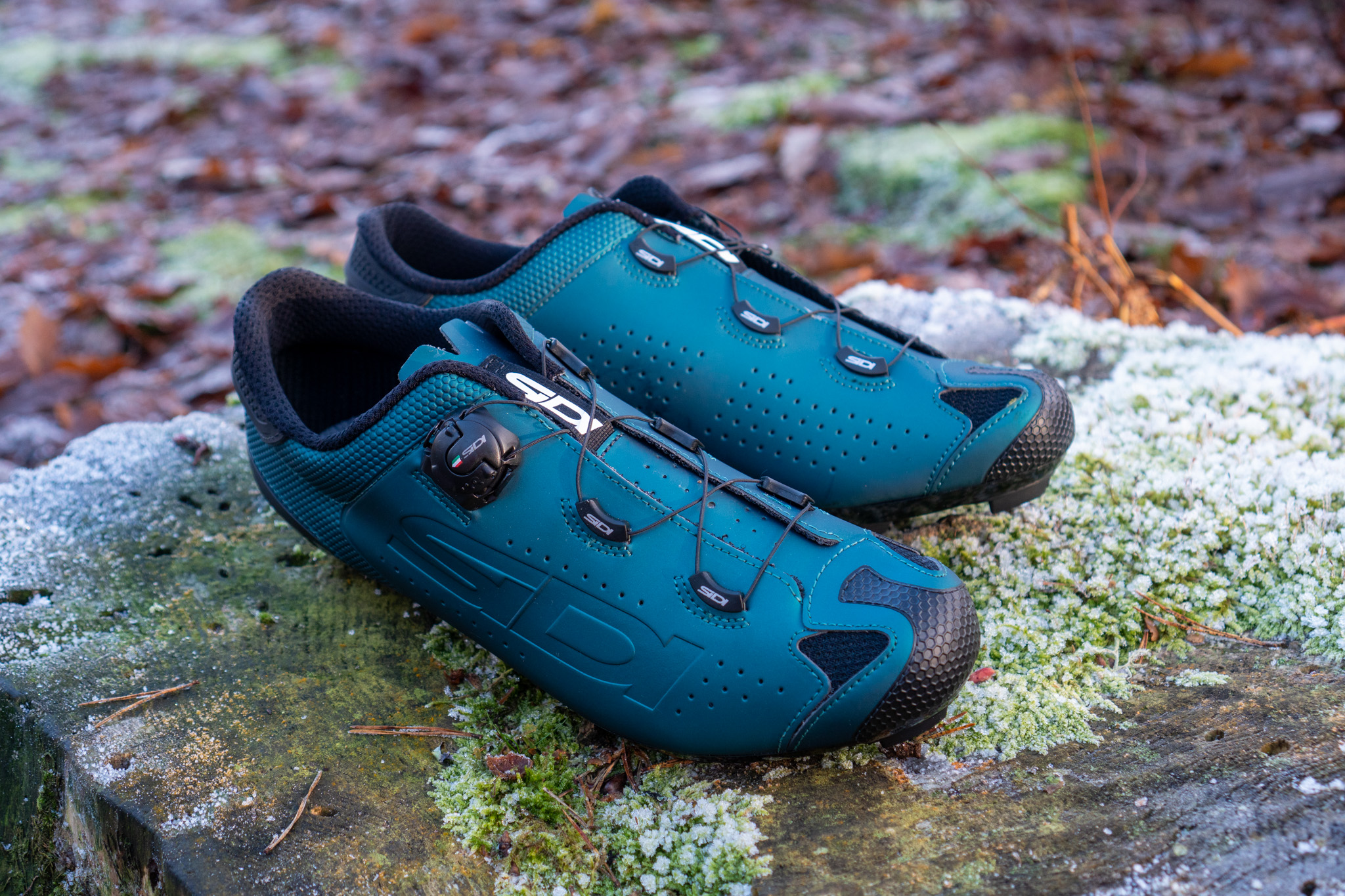
- £260 / $324.99 / €290 as tested
- Pros: Quick to break in; comfy on long rides
- Cons: Pricey; could do with a second Tecno-3 dial
Sidi's Dust MTB are the brands top-tier nylon soled XC shoes, and feature a Tecno-3 dial for closure and aero texture on the front for claimed watt saving.
The shoes are comfy for long days in the saddle, making them a good fit for gravel riders or marathon racers.
We did find the single Tecno-3 dial to be a drawback, with the single dial taking all the load when tightening the shoe to a comfortable and stable fit making it difficult to get the shoes tight enough.
Specialized Recon 2.0

- £175 / $170 / €170 / AU$250 as tested
- Pros: Plenty of cleat adjustment; stiff and efficient sole; good for walking
- Cons: Pricey; can take some time to get used to insole
The Recon 2.0 is based on Specialized's top-of-the-range cross country shoes and offers good power transfer with enough flex for off-the-bike walkability.
A small bedding-in period is needed, but after a couple of rides the shoes proved comfortable for long days in the saddle.
The sole is stiff enough for cross-country racing, while remaining flexible enough to remove chatter through the pedals.
Best MTB flat-pedal shoes
The best mountain bike flat-pedal shoes will stick to your pedals and enable you to get a foot down when things get wild. Made for going full-gas downhill, these shoes are robust and there are plenty of options, from summer slippers to shoes that will keep your feet dry and toasty in the winter.
Specialized 2FO Roost flat-pedal shoes

- £110 / $120 / €110 / AU$220 as tested
- Pros: Superb traction; very comfortable; footbed aids comfort
- Cons: Suede section can collect mud
The Specialized 2FO Roost flat-pedal shoes use a new sole compound that is super-sticky and on a par with Five Ten's leading soles.
Inside, there is a Body Geometry footbed that Specialized has spent a lot of time perfecting, and helps the shoes reach their high comfort levels.
The upper isn't great in bad weather, with a suede toebox that attracts mud, but thankfully the shoes are quick-drying.
Endura MT500 Burner Flat
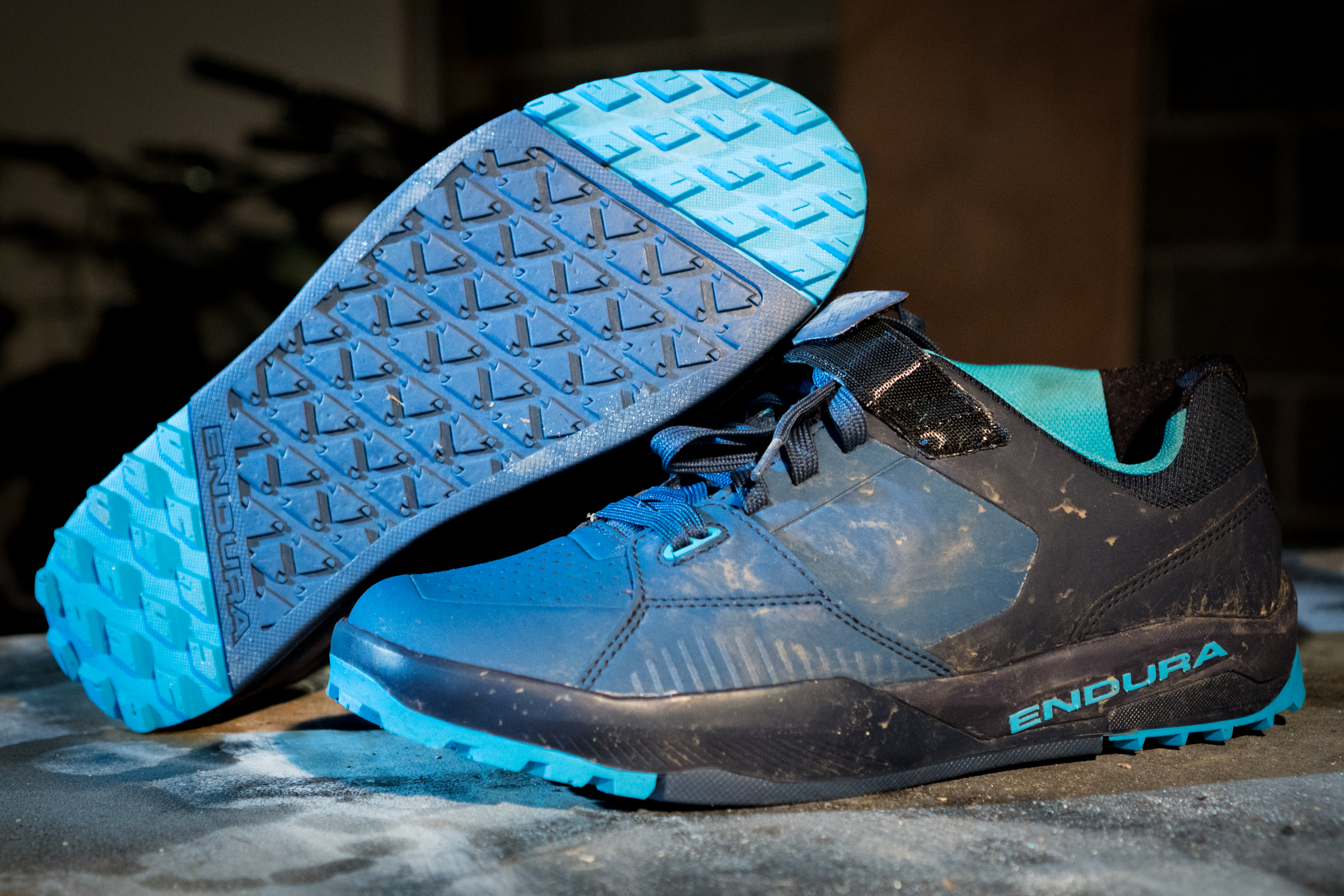
- £119.99 / $149.99 / €149.99 as tested
- Pros: Comfortable and secure; impressive grip
- Cons: Tongue area lets water in
The Endura MT500 Burner Flats have a super grippy sole that provides loads of traction, with only the largest bumps causing them to move across the pedal's surface. The sole is also stiff but doesn't dumb down feel.
The upper is lightweight, quick-drying, robust and easy to care for thanks to its wipe-clean material. However, the shoes would benefit from a lace cover because they let water in around the tongue.
Ride Concepts Vice flat-pedal shoes

- £90 / $100 / AU$205 as tested
- Pros: Decent grip; really comfy; well-finished
- Cons: Suede finish is hard to keep looking fresh
The Ride Concepts Vice shoes were developed with the brand's dirt jump and slopestyle riders, giving an idea of what these shoes are intended for.
The shoe has a hexagonal print on the sole that gives more than enough grip. The build quality of the sole is also excellent.
There is D30 material across the heel and toe, a reinforced toe bumper for protection, while metal eyelets and a tongue gusset are nice details.
These shoes might not tick all the boxes for trail or downhill riding, and the suede finish might not be ideal if you ride in the wet or on muddy trails.
Shimano GF400

- £120 / $120 / AU$150 as tested
- Pros: Plenty of traction; snug-fitting; decent value for money
- Cons: Not the most ankle protection
Shimano's GF400 provide excellent levels of grip that keep your feet in position on even the most gnarly trails.
There's a snugness to the fit, which reduces movement inside the shoe, adding to a secure feeling when ploughing through rocky sections of trail.
We found the shoe lacked a little ankle protection, with the inside cuff not quite high enough.
Despite this, the GR400s make a good option for hitting gravity-focused trails.
Unparallel Dust Up
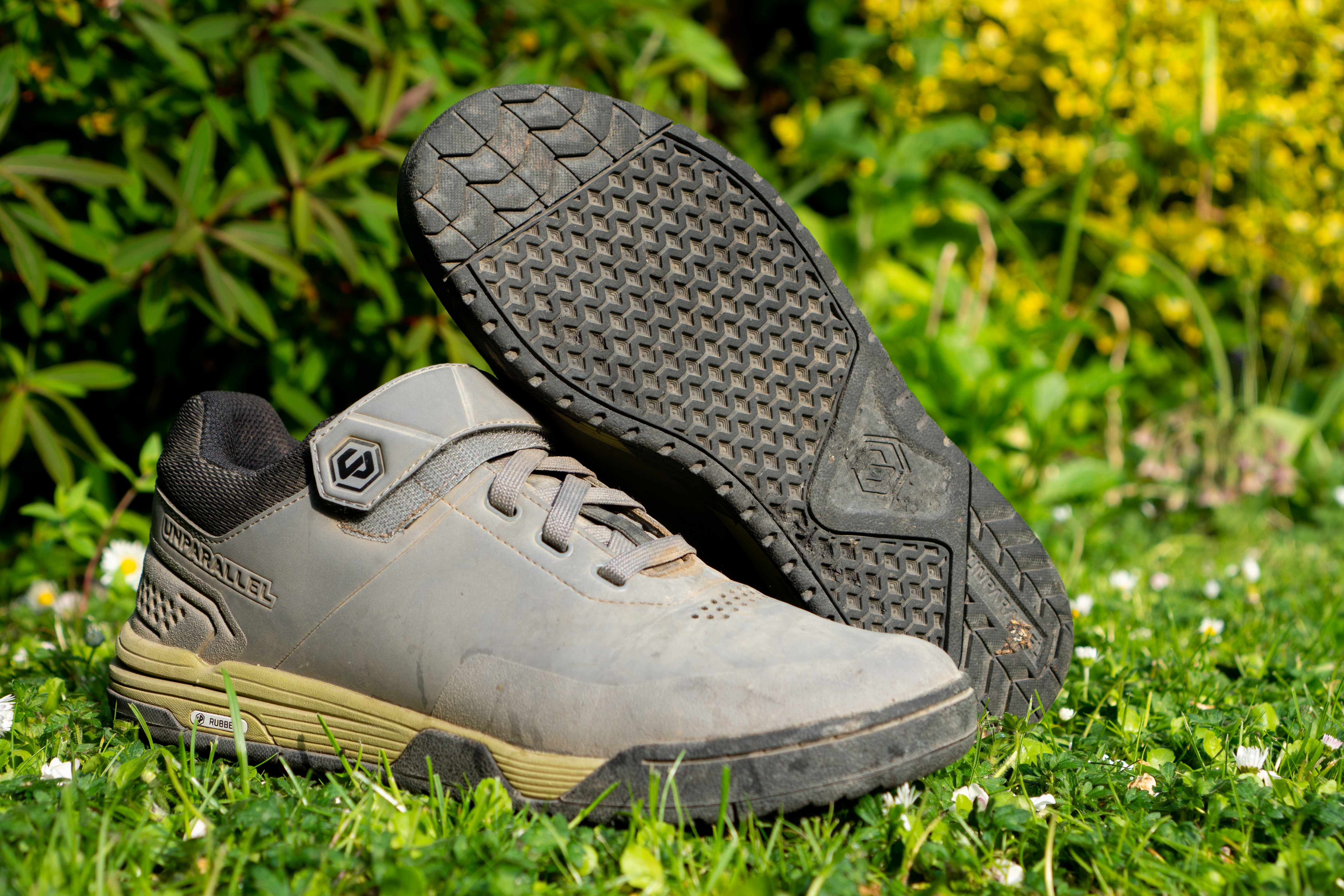
- £125 / $149.95 as tested
- Pros: Wipe-clean upper; good breathability; grippy sole
- Cons: Some foot slip in certain conditions
Unparallel's first foray into mountain bike shoes shows great promise, with the Dust Up offering impressive grip thanks to a tacky rubber sole.
We did find the sole to be very stiff, which led to numbing and reduced traction on gnarly sections of trail.
The shoes are also quite light, with the minimal padding making them breathable and quick to dry out.
Why you can trust BikeRadar
BikeRadar has been an authority on bikes and cycling tech since its inception in 2007, delivering the world’s best riding advice.
We have experts testing all types of bikes, parts, clothing and accessories, from road, mountain and gravel bikes to commuting, bikepacking and electric bikes.
Our reviews are always editorially independent – with no exceptions. Our reviewers comprehensively test all products in the real world, always reflecting on performance, value and the wider market when delivering their verdicts and review ratings.
We have more than 15,000 product reviews available at your fingertips, as well as expert buying, maintenance, training, skills, health and fitness advice.
Our annual Bike of the Year test is an industry benchmark and the BikeRadar team consists of some of the most experienced riders and testers in the business.
Mountain bike shoes buyer’s guide
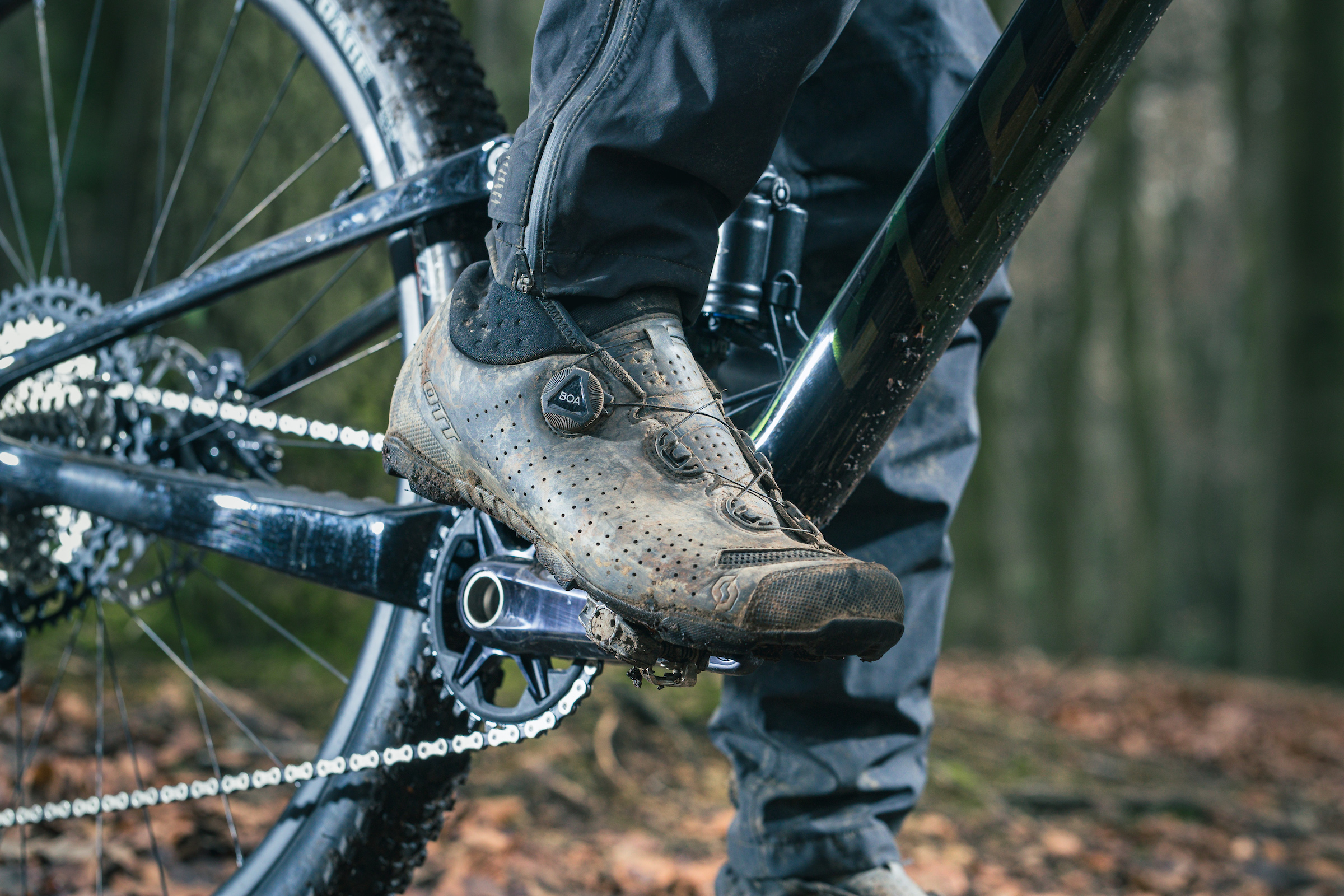
Mountain bikers have two options when it comes to footwear: clipless shoes or flats.
What shoes you choose is up to you and will depend on your choice of the best mountain bike pedals. Both types have their benefits, but picking the right option is important because different styles work better in different situations.
Which mountain bike shoes are best for you?
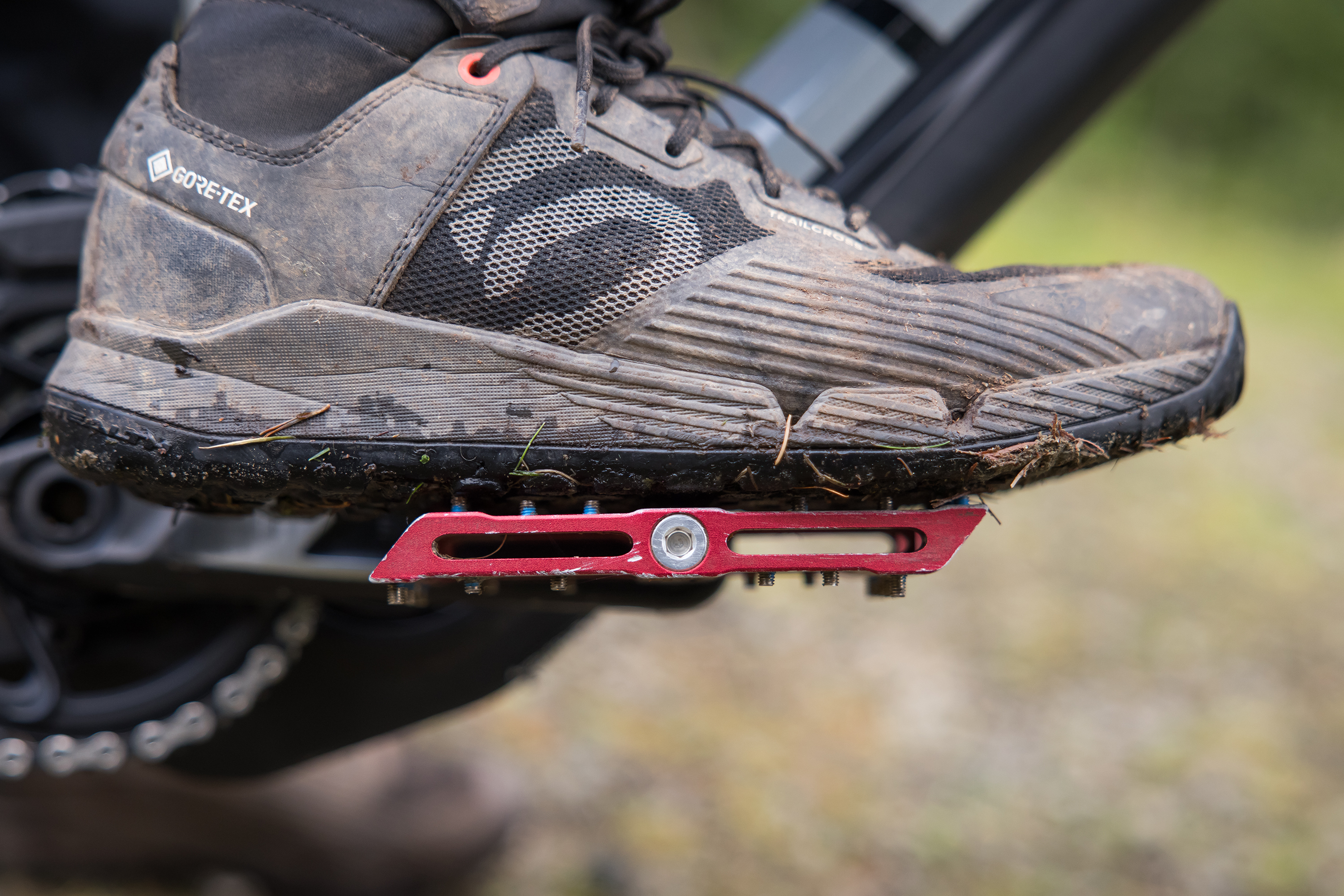
There’s no right or wrong answer, but it’s well worth considering what type of riding you’ll mostly be doing – XC (cross-country), trails or gravity-orientated riding – because this will influence your decision.
Flat-pedal shoes tend to be orientated towards trail, enduro and downhill riders, where feel and grip on the pedals, as well as protection, are important. Some flat-pedal shoes have soles that are stiffer than others, but none are as stiff as a dedicated cross-country shoe.
Clipless-pedal shoes come in a wider variety of forms, catering to virtually every sort of rider. They range from XC shoes, which are much like road shoes but with a little bit of tread on the soles, all the way to DH shoes that resemble their flat-pedal counterparts, save for cleat mounts.
Unsure of what's right for you? Read our guide comparing flat vs clipless pedals for more information.
Fit

No matter what style of shoe you choose, if they don’t fit correctly they’ll be uncomfortable and won’t perform as well as they should.
We recommend you try before you buy because everyone’s feet are different and manufacturers use different lasts to build their shoes.
Ensure there’s enough wiggle room for your toes and a decent hold on your heel for comfort and power transfer.
You should also make sure there are no hot spots or parts that dig in because these will become painful on longer days in the saddle.
Retention system

The retention system is what keeps the shoes on your feet. Laces are the traditional option, but there are alternatives.
Laces give you great control over a shoe’s feel and fit but can’t be adjusted on the fly and can get claggy with mud – unless they’re protected by a lace flap.
Boa systems use a ratchet dial and a wire that’s looped through the shoe’s opening for quick, easy and accurate closure and adjustment. They’re found on pricier shoes and tend to be specced to help save weight.
Velcro straps and ratchet buckles are more common and pretty rugged but weigh a bit more. They tend to come on cheaper and mid-price shoes.
Sole

The sole is key in defining how the shoe performs. XC riders will want a stiff sole that transfers every watt of power to the pedals (though how much of a difference a stiff sole makes is debatable). A stiff sole also helps improve comfort when the shoe is perched on a small clipless pedal.
Pricier shoes will benefit from a light and stiff carbon sole, while cheaper ones use plastic, which is heavier and more flexible.

Trail and enduro riders tend to go one of two ways: either an XC-style shoe with more protection and a more aggressive tread or a gravity-orientated shoe with a more flexible, comfortable sole and a construction that performs better with clipless pedals that have a platform.
Generally speaking, weight and sole stiffness are of no concern to gravity-orientated riders, so they tend to go for shoes that offer plenty of pedal feel and foot protection.
Tread pattern is also important. Some shoes offer a lightweight minimal tread, which is great for racing but will come up short if you need to run or walk anywhere while out on the trail. Others offer more grip and protection but weigh a little more as a result.
More cycling shoe options

Cross-country mountain bike shoes lend themselves to multiple applications, with many riders choosing to use them for gravel riding and road riding.
If you're after shoes focused on these disciplines, why not check out our best gravel shoes and best road cycling shoes to see our top picks?